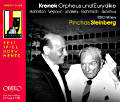
NEW RELEASES
NEW RELEASES of the last 12 months
COMING SOON
ARCHIVE
AWARDS
CDs
SACDs
LPs
MCs
CATALOGUE NUMBERS
|
|
ORFEO International – Reviews
Important Releases Briefly Introduced
September 2016
Salzburger Festspieldokumente 2016
“Happiness is otherwise” – valuable new festival rarities
In a world obsessed with short-term gain and moving at an ever faster pace, the classical music scene cannot fail to be even more keenly aware of its special status – and recognize it as a great advantage that must be cherished and nurtured. The epitome and essence of such awareness may be found in festivals in which works well worth hearing are celebrated in performances of the finest quality, compiled into thematic programmes. 
C 923 162 I 
C 924 161 B
C 926 161 B
C 927 161 BSuch festivals gain added value when they can shape their own existence, moving forward from an uncertain yearly platform to emerge as a fixed point of reference that serves as a role model to others. The Salzburg Festival was established by Richard Strauss and others at a difficult time for the arts, after the disaster of the First World War and the demise of a vanished world. The wealth of broadcast recordings that has accumulated since 1925 gives ORFEO the renewed opportunity this year to offer carefully chosen gems.
The festival’s co-founder Strauss was a contemporary composer in his time, still capable of writing new and original works more than two decades later, and so the performance of contemporary works remains at the heart of the Festival’s identity, not least as a commitment and a counterbalance to assiduous cultivation of the classics. At a time in which the umpteenth new recording of classical works often seems less than essential, credit is all the more due to the Festival for programming “new music” that is already over a century old. One of this year’s new releases is Krenek’s Orpheus und Eurydike, a work that is several things rolled into one: “classical” subject-matter in the sense of a further reworking – in this case, of the creation myth of opera itself, not just since Monteverdi (1607), but since the primal “big bang” of the operatic cosmos with Caccini/Peri (1600); one of the timeless tales of human existence linking love, longing for the past and their transcendence in art; a bang-up-to-date work of art that nevertheless remains a work of its time, the era in which the Festival was founded; and above all a festal tribute to honour the 90th birthday of a major 20th-century composer. Krenek himself attended the1990 Festival performance documented here. Kokoschka’s stormily Expressionist narrative was put to paper between 1915 and 1917 in the aftermath of a passionate love affair with Alma Mahler, and set to music in headstrong mixed style by Schoenberg’s highly independent pupil between then and 1923. Given the literary standing of the librettist (and of the composer), ORFEO is additionally printing the libretto (from which the title of our text is taken), also bearing in mind that this recording is the first and only one ever to be released.
Nikolaus Harnoncourt will undoubtedly prove to be one of the most influential musicians of our time, and his importance cannot possibly be summed up in a few words. His death early this year, and his absence from the world of music in years to come, have effects that cannot yet be properly assessed or even contemplated. All those who knew Harnoncourt well and valued his work know how he was driven by the passion for doing things differently and starting again from the beginning, and the “intermediate stage” of a rare collaboration with the Vienna Philharmonic in Beethoven is thus of the very greatest interest.
The musical life of our times is happily blessed with an abundance of young new string quartets. That makes it all the more instructive to go back to an older quartet always hailed as a pioneer of the highest modern standards and go beyond its studio recordings to the quartet’s heyday and the “acid test” of a concert (1965). And that conforms to the maxim of the Juilliard String Quartet that new music should sound classical and old music should sound like new, not only with Dvořák and Mozart but even with Bartók.
One further release explores the field of vocal music, and lieder in particular. The lieder recital no longer seems to be such a self-evident feature of musical life as it once was, but at the Salzburg Festival it always had a special place of its own, and that place has certainly been due in part to the presence of “leading lights” of the music scene. Looking back to the most recent decades, we see that like Dietrich Fischer-Dieskau before her, there was nobody in the Eighties and Nineties who could so captivate the audience at a lieder recital, with a dramatic art and a wealth of vocal resources that defied comparison, as the inimitable Jessye Norman. All who can consider themselves lucky to have caught her in those years, doing what she did best of all, will count themselves equally fortunate – no less than new enthusiasts coming fresh to her work – to discover (or renew acquaintance with) an additional programme by the diva, sensitively accompanied by James Levine, effortlessly superb and impeccably quadrilingual in Richard Strauss, Tchaikovsky, Wagner’s Wesendonck Lieder and – with their high “repertoire value” – the rarity of Schoenberg’s Brettl-Lieder, Viennese rather than modern.
top |
|

ORFEO
Chormusik & Oratorien
Edition zeitgenössisches Lied
Kammermusik
Lied
Musica Rediviva
Oper
Recital
Symphonie & Konzert
Weihnachten
ORFEO D'OR
Bayerische Staatsoper live
Bayreuther Festspiele live
Deutsche Oper am Rhein
Salzburger Festspieldokumente
Wiener Staatsoper live
Wiener Symphoniker
Dirigenten
Große Sänger d. 20. Jh.
Orchesterkonzerte
Quartette
Solisten
|